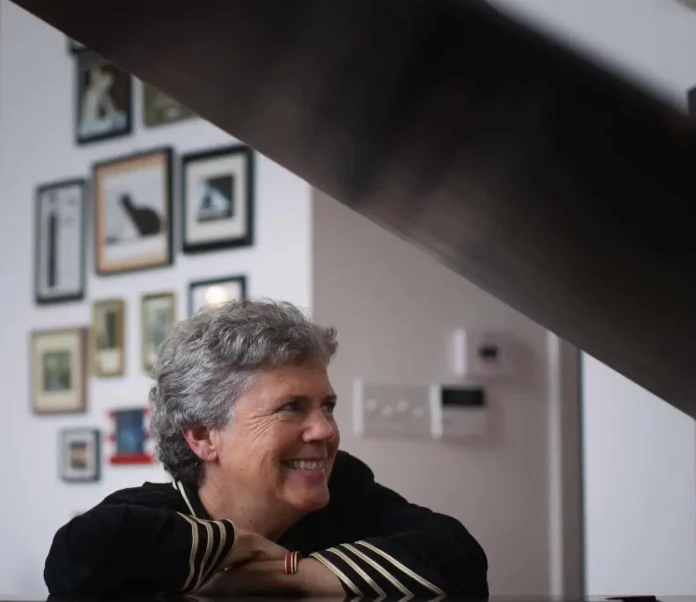Claire Ritter: Songs Of Lumière (Zoning Recordings ZR 1014)
Jazz miniatures were once dictated by the amount of music you could spin on to a shellac disc. Later, an LP’s vinyl value-for-money was often reflected in the number of its charts, their duration averaging four to five minutes.
American pianist-composer Claire Ritter makes a case for them as ends in themselves. The longest track on her latest solo recording lasts 4:17, the whole album amounting to just over 42 minutes. Brevity here suggests fleeting visits to the keyboard, where no depths are plumbed and no heights ascended. But this is far from the case; Ritter imbues brevity with concentration and focus.
That’s meant as an explanation of why all these songs – Ritter originals including two new compositions and five interspersed standards, one an alternative take – explore light and shade in terms of what she calls “the magic, solitude, and strength of nature”. This suggests the pursuit of emotional states, one consequence of which is no lack of regret if they prove elusive.
Colour The Dream, one of the 10 Ritter originals, is ornately delivered, with some unexpected harmonies lightly emphasised, and an improvisatory quality – one suspects a deal of extemporisation throughout, however much recollected – that’s typical of the whole album. She has much fun with her beguiling tango, Girl With The Tattooed Eyes, not least in the dispersal of sforzandi to give the imagined dancers a jolt. Leigh Harline’s When You Wish Upon A Star proceeds at a moderately jaunty pace, displaying a perky middle eight; and River Of Joy, another original, flows gently but insistently centre-stream, free of turbulence.
There are two takes of Charles Trenet’s I Wish You Love, its catchy melody both nudged forwards and coloured contrapuntally by the left hand, which in Benny Harris’s Crazeology – forever associated as classic bop with Charlie Parker and often credited to him as composer – works overtime to some effect.
Ritter’s method was described by Boston writer Ed Hazell as “among the most successful synthesis [sic] of jazz and classical music”. On this album, it’s not so much a melding that creates its own sound but a technique brought to bear on a genre: restrained classical technique addressing jazz formality – and keeping it short in case style gets the better of originality.
Danny Grissett: Travelogue (Savant SCD 2220)
Travel plays such a big part in an active jazz musician’s life that one wonders why it’s not formally recognised more often as a feature of the music. Maybe hitting the road at midnight for a 150-mile journey home after a three-hour gig is best relegated to the category of occupational drawback. It’s taken its toll in jazz.
New York pianist Danny Grissett sees it differently, and his trio’s album is full of the joys of wandering to work, arriving, and taking off again. So much so, that the measured sophistication of his playing is unaffected by what is often travel’s banality, and he has set himself free to concentrate on his trio’s happy interlocution. As if to deny that travelling is anything but an inspiration, the intelligence and refinement of his playing is duplicated in his liner notes, where a musician’s journeys are communicated in wholly positive terms. Like most musicians’ comments on their music, however, Grissett’s reveal the essential disconnect that listeners must repair themselves.
There’s nothing obviously illustrative about these charts, except perhaps The After Hours, in which night-life is given a buzz, and the super-slow version of Burke/van Heusen’s Here’s That Rainy Day, which speaks for itself as something that stops you going out; here, it’s essayed as an ensemble chart commandeered throughout by Grissett’s piano, with classy adumbrations by bassist Vicente Archer and drummer Bill Stewart.
Considering how enervating and time-consuming rushing around can be, Grissett’s acceptance of what it has to offer is reflected in playing of great equanimity. It’s urbane, detailed and harmonically rich trio music, if sometimes lacking a feeling of spontaneity – Whitney Balliett’s “sound of surprise”. Maybe he doesn’t like travelling fast.
Mark Solborg/Tungemål: Confluencia (Ilk Music ILK 366CD)
Integrity is key in Tungemål, the quartet led by Danish guitarist Mark Solborg. That said, its resistance to dissolution allows for voyages of sonic discovery that stretch its possibilities. One of the regions it vacates is what we traditionally recognise as jazz, despite echoes of the electronic Miles Davis in the trumpet-playing of Susana Santos Silva, which often overblows into its own compressed frequencies while following the simple melodic lines assigned to the instrument by Solborg’s compositions.
Solberg wrote eight tunes and shares credits with Santos Silva and pianist Simon Toldam for one other. The quartet’s modus operandi, on this album in particular, has much to do with Solborg’s additional responsibilities for sundry electronica and the membranophonic effects created by percussionist Ingar Zach.
Despite the movement initiated by ostinati on Southern Swag and the metronomic mood that gets Cantamos under way, there’s often a feeling of stand-and-deliver as themes gather about them a range of sonic variables. The adjective “nominal” to describe Solborg’s leadership applies because the guitar in its familiar form is discrete and part of the mix, only in Planes; Inward coming across as broodingly elegiac, with other emotions elsewhere less obviously exposed. Friction, Bell, Bump is onomatopoeic, Janus -Og Sidste Ord a journey of two dimensions with reprise. The Wires, with Solborg playing acoustic, is an example of how otherwise transparent textures can thicken and intensify. Tungemål means “idiom”, here expressed as a multi-voiced coming together to address society’s challenges.
Tungemål is both band and continuing project. Solborg’s minimalism appeals to the quartet’s spirit of free association, but whether the listener will find in the music what Solborg extrapolates from it is, for this reviewer, debatable.


